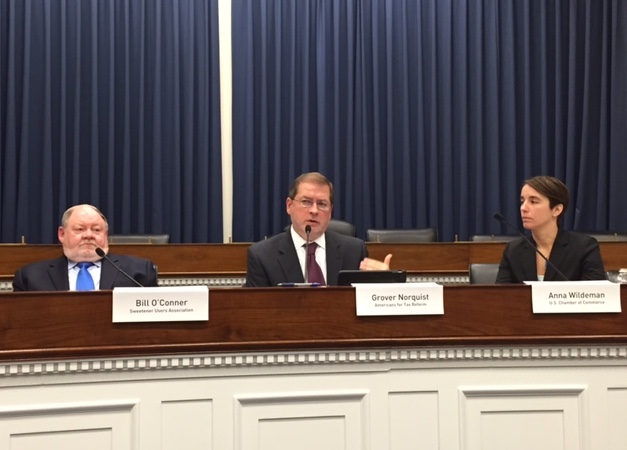
Americans for Tax Reform president Grover Norquist this week spoke at a Congressional Briefing on U.S. sugar reform hosted by Rep. Bill Shuster (R-Penn.), where Mr. Norquist and three other experts called for an end to policies under the U.S. Sugar Program that harm American taxpayers, consumers, and businesses.
Addressing a standing room only crowd at the Rayburn House Office Building, Mr. Norquist charged that the sugar program amounts to a system of corporate welfare that allows the sugar industry to “get rich on other people’s money,” branding the sugar reform fight as “the new Ex-Im.”
Norquist also issued a warning to Congress that “those politicians who vote to maintain the status quo with the Sugar Program are opening themselves up to more scrutiny than they’ve had in the past.”
The briefing included opening remarks by Rep. Bill Shuster (R-Penn.) and Rep. Mike Kelly (R-Penn.), with Shuster stating, “this briefing lays the groundwork for a needed discussion on the issue, and I will continue working with my colleagues to make reforms to the program.”
Speaking on the domestic impacts, the panel noted that the program cost American taxpayers nearly $300 million in 2013 alone, and the Congressional Budget Office projects it could cost taxpayers an additional $115 million over the next 10 years. It was also pointed out that the program has contributed to the loss of nearly 10,000 jobs annually in the U.S. food industry, and that for every one sugar-growing job saved by high U.S. sugar prices, approximately three U.S. manufacturing jobs are lost.
While most of the panel’s focus was on the domestic impacts of the sugar program, the discussion also expanded to issues the program causes for American trade negotiations. “This disrupts all of our efforts to get free trade and damages every American exporter and consumer not just in this zone, but because in order to do this stupid thing to our consumers we have to give way on other stuff that also does damage to our consumers and our producers,” Norquist stated.
Looking ahead the panel noted that opportunities for reforming the program could soon come in an appropriations bill or during the budget process.

